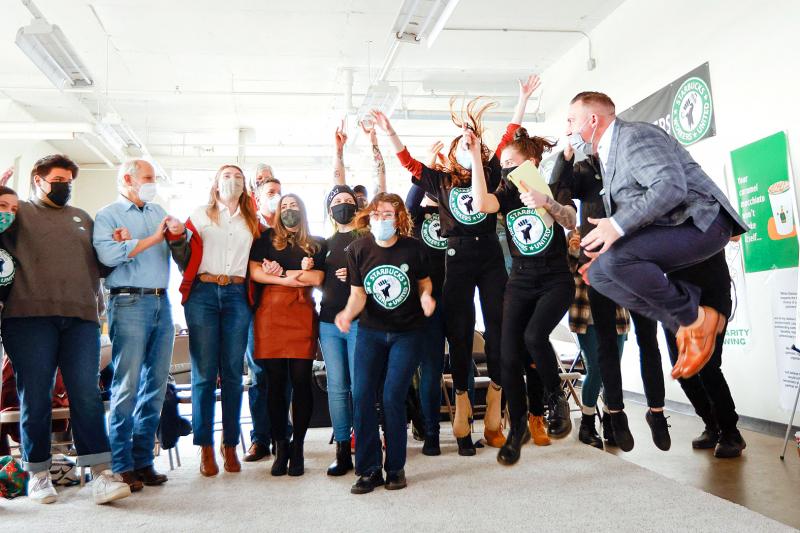Starbucks Corp employees voted for unionization at one of two New York restaurants where ballots have been counted on Thursday afternoon, with the fate of a third store yet to be decided.
The first store’s vote was 19-8 in favor of unionization. If formally certified by the National Labor Relations Board, the agency conducting the elections, it would establish a union foothold among the coffee chain’s thousands of corporate-run US locations. The second store’s vote was 12-8 against forming a union.
The tallying of votes from the trio of sites follows a four-week mail-in voting period. Workers at those three Buffalo-region locations petitioned in August to join the Service Employees International Union affiliate Workers United, which has recently filed for additional elections at three more New York sites and another in Arizona.

Photo: Reuters
The victory, a potential watershed for a labor movement that in recent decades has hardly ever prevailed in such elections at the largest nonunion employers in the US, could inspire a flurry of new organizing efforts, as well as a fierce and lengthy struggle for the store’s employees to secure a collective bargaining agreement.
Nelson Lichtenstein, a historian who directs the Center for the Study of Work, Labor and Democracy at the University of California at Santa Barbara, said the news might spark another 50 to 100 Starbucks shops to push for their own elections.
“When and if that happens, it will be much more difficult for Starbucks and its anti-union law firms to scurry about the country suppressing these insurrections,” Lichtenstein said via e-mail.
After ballots are tallied at each store, both sides would have the chance to submit allegations of misconduct and offer arguments against officially certifying the results.
An acting regional labor board director in October ruled that workers could vote store-by-store at the first three locations, meaning that Starbucks would be required to collectively bargain if a majority of voters at any one of those sites supported unionization.?
The company sought to derail the elections before they were carried out, arguing that any contest should instead involve at least all 20 of the region’s stores — which would have made it more difficult for the union to prevail.
Starbucks also pleaded unsuccessfully with the labor board to intervene and quash the mailing of ballots last month.
Last month, former Starbucks CEO Howard Schultz even went to speak to workers at the New York stores.
In a letter to employees Tuesday, Starbucks CEO Kevin Johnson wrote that “we respect the process that is underway and, independent of any outcome in these elections, we will continue to stay true to our mission and values.”
In a labor board complaint filed last month, the union alleged that Starbucks management has responded to organizing efforts “by engaging in a campaign of threats, intimidation, surveillance” and other illegal activity. Starbucks has said that it strictly complies with labor laws.

South Korea’s equity benchmark yesterday crossed a new milestone just a month after surpassing the once-unthinkable 5,000 mark as surging global memory demand powers the country’s biggest chipmakers. The KOSPI advanced as much as 2.6 percent to a record 6,123, with Samsung Electronics Co and SK Hynix Inc each gaining more than 2 percent. With the benchmark now up 45 percent this year, South Korea’s stock market capitalization has also moved past France’s, following last month’s overtaking of Germany’s. Long overlooked by foreign funds, despite being undervalued, South Korean stocks have now emerged as clear winners in the global market. The so-called “artificial intelligence

‘SEISMIC SHIFT’: The researcher forecast there would be about 1.1 billion mobile shipments this year, down from 1.26 billion the prior year and erasing years of gains The global smartphone market is expected to contract 12.9 percent this year due to the unprecedented memorychip shortage, marking “a crisis like no other,” researcher International Data Corp (IDC) said. The new forecast, a dramatic revision down from earlier estimates, gives the latest accounting of the ongoing memory crunch that is affecting every corner of the electronics industry. The demand for advanced memory to power artificial intelligence (AI) tasks has drained global supply until well into next year and jeopardizes the business model of many smartphone makers. IDC forecast about 1.1 billion mobile shipments this year, down from 1.26 billion the prior

People stand in a Pokemon store in Tokyo on Thursday. One of the world highest-grossing franchises is celebrated its 30th anniversary yesterday.

Chinese artificial intelligence (AI) start-up DeepSeek’s (深度求索) latest AI model, set to be released as soon as next week, was trained on Nvidia Corp’s most advanced AI chip, the Blackwell, a senior official of US President Donald Trump’s administration said on Monday, in what could represent a violation of US export controls. The US believes DeepSeek will remove the technical indicators that might reveal its use of American AI chips, the official said, adding that the Blackwells are likely clustered at its data center in Inner Mongolia, an autonomous region of China. The person declined to say how the US government received